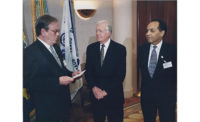Like an unsteady concrete canoe, the job market for new civil engineering graduates seemed shaky last week to attendees at the first-ever national student conference of the American Society of Civil Engineers. The June 21-24 event in Madison, Wis., drew 1,200 students from 112 schools, but recruiters from just 33 organizationsone-third of what organizers had expected.
"We were hoping for 100 firms," said Jeffrey S. Russell, chairman of the construction engineering and management program at the University of Wisconsin, Madison, which hosted the event. "I kept hearing, 'we cut our budget and we're not hiring.'" While the National Association of Colleges and Employers ranked civil engineering as one of the top 10 majors with job offers for new graduates, employment-related activity was slow at the meeting's career fair. The conference also kept attendees busy by combining, for the first time, technical sessions and competitions in concrete canoe construction, steel bridge design and environmental treatment technology. ASCE contributed $250,000 toward the conference to celebrate its 150th anniversary, among other industry donors.
Centennial Contractors Enterprises Inc. had come to recruit up to 20 upcoming 2002 and 2003 graduates, at annual starting salaries of $40,000 to $45,000. "I'd been expecting that students would be handing out resumes," said Ashley B. Abplanalp, a human resource specialist from Centennial's office in Vienna, Va. "It has been a disappointment. Still I know that the caliber of students here has to be pretty intense."
With more than 3,000 employees nationwide, Omaha-based HDR came to hire another five to 10 at annual starting salaries of $36,000 to $48,000. But many students hung back. "It seems right now that there's a lot of tirekicking rather than handing out of resumes," said Richard A. O'Gara, HDR's employment director.
In khaki shorts and a T-shirt, 22-year-old Evan M. Currid listened to O'Gara's pitch. Set to graduate in December with a bachelor's degree in civil-structural engineering from Virginia Polytechnic Institute & State University in Blacksburg, he remains undecided about a career or "life enjoyment." He notes two previous construction industry internships, including one where "I sat in a cubicle with plans, doing take-offs....It was a coffin," and another where new graduates know that "you're going to work slave hours," he said.
Recruiters came looking for what several described as outgoing, quick-learning achievers with prior industry internship or work experiencenot necessarily high grades. "We want [graduates] that can get results," said Jack Marshall, underground district engineer at Kiewit Construction Co., Omaha. "We're looking for [those] willing to stand up and be leaders in our firm," added Frederick W. Groth, a principal at Graef, Anhalt, Schloemer & Associates Inc., Madison.
CH2M Hill Cos., Denver, which employs 11,000 people nationally, sent its Milwaukee-based recruiter, Kevin J. Gill, to the career fair mostly to establish brand recognition and to give students something to remember when the economy picks up or they decide to switch employers some day. "I do a lot of career fairs," he said. "This is the first one that isn't 'recruit, recruit, recruit.'"


Post a comment to this article
Report Abusive Comment